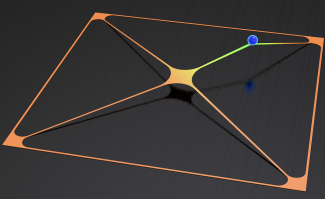Mechanical resonators featuring large tensile stress have enabled a range of experiments in quantum optomechanics and precision sensing. Many sensing applications require functionalizing tensioned resonators by appending additional mass to them. However, this may dramatically change the resonator mode quality factor, and hence its sensitivity.
In our work published in Physical Review Applied, we study how mode quality factor depends on suspending a mass on a type of membrane resonator known as a trampoline. Surprisingly, the quality factor becomes independent of the mass in the large-load regime, for any tensioned resonator, which explains previous related results and will enable new design perspectives.



 The Physics Frontiers Centers (PFC) program supports university-based centers and institutes where the collective efforts of a larger group of individuals can enable transformational advances in the most promising research areas. The program is designed to foster major breakthroughs at the intellectual frontiers of physics by providing needed resources such as combinations of talents, skills, disciplines, and/or specialized infrastructure, not usually available to individual investigators or small groups, in an environment in which the collective efforts of the larger group can be shown to be seminal to promoting significant progress in the science and the education of students. PFCs also include creative, substantive activities aimed at enhancing education, broadening participation of traditionally underrepresented groups, and outreach to the scientific community and general public.
The Physics Frontiers Centers (PFC) program supports university-based centers and institutes where the collective efforts of a larger group of individuals can enable transformational advances in the most promising research areas. The program is designed to foster major breakthroughs at the intellectual frontiers of physics by providing needed resources such as combinations of talents, skills, disciplines, and/or specialized infrastructure, not usually available to individual investigators or small groups, in an environment in which the collective efforts of the larger group can be shown to be seminal to promoting significant progress in the science and the education of students. PFCs also include creative, substantive activities aimed at enhancing education, broadening participation of traditionally underrepresented groups, and outreach to the scientific community and general public.